War Horse
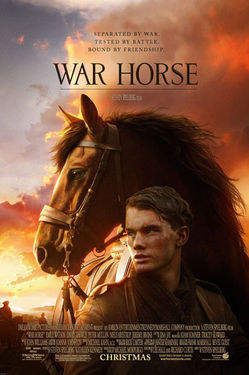
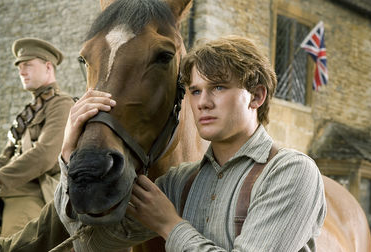 In many ways, the answer that Steven Spielberg's film has given me is yes. Even though the film cannot match the "theatrical magic" quality of the play, it more than makes up for it in emotion and the realism of the battle scenes. While it is a far cry from his work in Saving Private Ryan (this is, after all, a PG-13 family film), you can still see Spielberg digging up the same emotions and raw tension that he put forth in that earlier movie's depiction of the chaos and senselessness of war. As in that earlier movie, we get a sense of actually being there on the battlefield. This is not the choreographed or staged battles that we get in so many movies. Spielberg has a talent of making war as dirty, lonely, and frightening as it is in real life. How he is able to tap into such emotions, I have no idea. All I can say is that the battle sequences on display are some of the most harrowing and heartbreaking to come in a while.
In many ways, the answer that Steven Spielberg's film has given me is yes. Even though the film cannot match the "theatrical magic" quality of the play, it more than makes up for it in emotion and the realism of the battle scenes. While it is a far cry from his work in Saving Private Ryan (this is, after all, a PG-13 family film), you can still see Spielberg digging up the same emotions and raw tension that he put forth in that earlier movie's depiction of the chaos and senselessness of war. As in that earlier movie, we get a sense of actually being there on the battlefield. This is not the choreographed or staged battles that we get in so many movies. Spielberg has a talent of making war as dirty, lonely, and frightening as it is in real life. How he is able to tap into such emotions, I have no idea. All I can say is that the battle sequences on display are some of the most harrowing and heartbreaking to come in a while.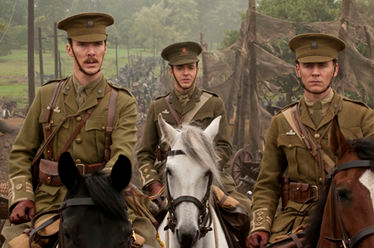 But long before that, War Horse is a simple story of a boy bonding with a farm horse in a plot that could have been lifted from any number of movies from the 1930s. The boy is Albert (newcomer Jeremy Irvine), a British teenager who acquires the horse when his alcoholic father (Peter Mullan) buys the animal with the money the family needs for the mortgage and food, just so he can show up their landlord (David Thewlis), who was trying to purchase the horse for his son. In order to pay off the debts they owe, Albert trains the horse (whom he names Joey) to plow and work in the fields. When heavy flooding rains destroy the farm's crops, Albert's desperate father is forced to sell Joey to the British military, as World War I is starting, and the army needs horses for their Calvary.
But long before that, War Horse is a simple story of a boy bonding with a farm horse in a plot that could have been lifted from any number of movies from the 1930s. The boy is Albert (newcomer Jeremy Irvine), a British teenager who acquires the horse when his alcoholic father (Peter Mullan) buys the animal with the money the family needs for the mortgage and food, just so he can show up their landlord (David Thewlis), who was trying to purchase the horse for his son. In order to pay off the debts they owe, Albert trains the horse (whom he names Joey) to plow and work in the fields. When heavy flooding rains destroy the farm's crops, Albert's desperate father is forced to sell Joey to the British military, as World War I is starting, and the army needs horses for their Calvary.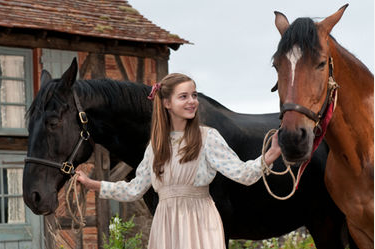 In the original novel by Michael Morpurgo, the story was told from Joey the horse's point of view. Fortunately, screenwriters Lee Hall (Billy Elliot) and Richard Curtis (Pirate Radio) find other ways to show the horse's story, without having to resort to an unintentionally comical voice over narration. They do this by following Joey's experiences in battle, and various situations he finds himself in, such as when he is involved with two young German soldiers deserting their duties, or when he is adopted by a young girl and her kindly grandfather. It does make the movie become somewhat fragmented, as Joey is dragged from one situation to the next, but it works in the case of this film. We also follow Albert, who joins the military in a desperate attempt that maybe he can find Joey, and bring him home with him. Seeing war from both a human soldier, and an animal that cannot comprehend what is going on around it is kind of fascinating in a way. Both are probably feeling the same emotions of confusion and terror. But only one of them went into war willingly.
In the original novel by Michael Morpurgo, the story was told from Joey the horse's point of view. Fortunately, screenwriters Lee Hall (Billy Elliot) and Richard Curtis (Pirate Radio) find other ways to show the horse's story, without having to resort to an unintentionally comical voice over narration. They do this by following Joey's experiences in battle, and various situations he finds himself in, such as when he is involved with two young German soldiers deserting their duties, or when he is adopted by a young girl and her kindly grandfather. It does make the movie become somewhat fragmented, as Joey is dragged from one situation to the next, but it works in the case of this film. We also follow Albert, who joins the military in a desperate attempt that maybe he can find Joey, and bring him home with him. Seeing war from both a human soldier, and an animal that cannot comprehend what is going on around it is kind of fascinating in a way. Both are probably feeling the same emotions of confusion and terror. But only one of them went into war willingly.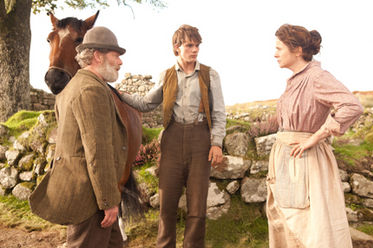 I'm sure that there will be many who accuse the movie of being cornball, and the movie does certainly wear its heart on its sleeve. But unlike less successful films that try and fail to be heartfelt, I never got the sense that Spielberg was pandering here. He believes in the story he is telling, and he sells it effectively, too. His cast help sell the material, with veteran actors like David Thewlis and Emily Watson both giving fine turns here. They also come across as good sports, since pretty much the entire cast has to be upstaged by the horse in just about every scene. There are also some really nice smaller moments, such as when a British and a German soldier briefly put aside their differences to help Joey get free from some barbed wire he's trapped in. Can this movie be manipulative? Oh my, yes. But Spielberg knows how to do so in such a way that I wasn't annoyed. I was actually kind of drawn in.
I'm sure that there will be many who accuse the movie of being cornball, and the movie does certainly wear its heart on its sleeve. But unlike less successful films that try and fail to be heartfelt, I never got the sense that Spielberg was pandering here. He believes in the story he is telling, and he sells it effectively, too. His cast help sell the material, with veteran actors like David Thewlis and Emily Watson both giving fine turns here. They also come across as good sports, since pretty much the entire cast has to be upstaged by the horse in just about every scene. There are also some really nice smaller moments, such as when a British and a German soldier briefly put aside their differences to help Joey get free from some barbed wire he's trapped in. Can this movie be manipulative? Oh my, yes. But Spielberg knows how to do so in such a way that I wasn't annoyed. I was actually kind of drawn in.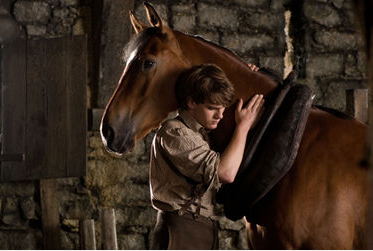
See the movie times in your area or buy the DVD at Amazon.com!






0 Comments:
Post a Comment
<< Home